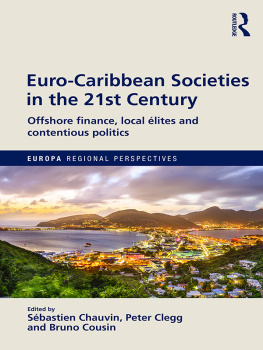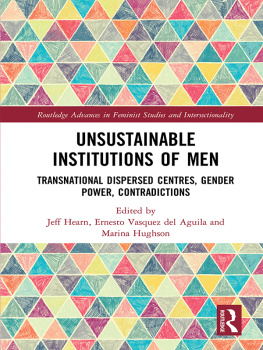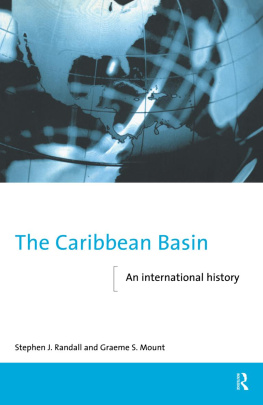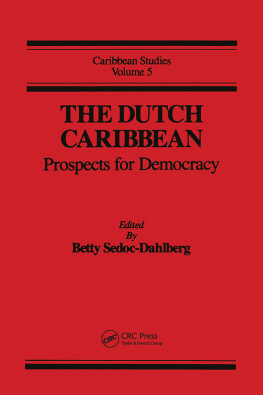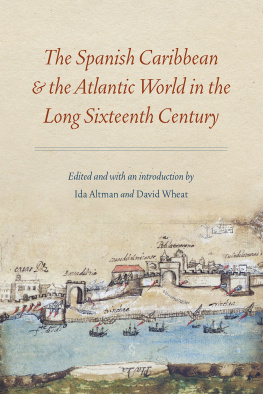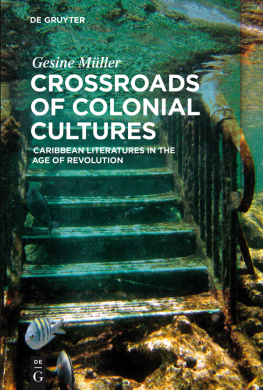Euro-Caribbean Societies in the 21st Century
This edited collection examines the realities of the last remnants of the European colonial empires in the Caribbean, namely the British, Dutch and French overseas territories.
Although known and perhaps infamous as high-end tourist destinations and financial centres, these small jurisdictions are complex and multifaceted places. While this volume considers their role in offshore finance, it does so from alternative and original perspectives by also examining how the financial sector shapes the makeup of these Caribbean societies. Additionally, post-colonial political relations between the territories and their metropolitan centres and with the European Union are the focus of several chapters, highlighting the stresses and strains, and in many cases the unfulfilled expectations, of devolved governance. Finally, further chapters reflect more specifically on the territories internal social and ethnic dynamics, and the hierarchies and inequalities that result. Several contributions therefore describe the economic instability and factors of political conflict faced by these societies and the available options to address them.
Bringing together a variety of different disciplinary perspectives, from political science to sociology, and from anthropology to economics, this book will be of great interest to any academic or student who wishes to see how an often overlooked part of the world proves to be a key site of socio-economic transformation and a crucial nexus in global affairs.
Sbastien Chauvin is a sociologist and an Associate Professor at the Institut des Sciences Sociales at the University of Lausanne, Switzerland. His research deals with immigration, citizenship, gender, sexuality, law and labour in France, the Netherlands and the USA.With Bruno Cousin, he has been developing a multi-sited research programme on the cultural sociology of economic lites.
Peter Clegg is Associate Professor in Politics and Head of the Department of Health and Social Sciences at the University of the West of England, Bristol, UK. He was formerly Visiting Research Fellow at both KITLV/Royal Netherlands Institute of South East Asian and Caribbean Studies, Leiden, Netherlands, and at the Sir Arthur Lewis Institute of Social and Economic Studies (SALISES), University of theWest Indies, Jamaica.
Bruno Cousin is Assistant Professor of Sociology at Sciences Po, France, and an affiliate of the Centre of European Studies and Comparative Politics (CEE). His research interests focus on class relations, residential segregation, social capital and forms of bourgeois sociability, and the modes of lites legitimization. He is currently conducting research with Sbastien Chauvin on Saint-Barthlemy (French West Indies), whose first results have been published in Ethnologie franaise and Geographies of the Super-Rich (2013), and he has recently co-authored Ce que les riches pensent des pauvres (2017).
Europa Regional Perspectives
Providing in-depth analysis with a global reach, this series from Europa examines a wide range of contemporary political, economic, developmental and social issues in regional perspective. Intended to complement the Europa Regional Surveys of the World series, Europa Regional Perspectives will be a valuable resource for academics, students, researchers, policymakers, business people and anyone with an interest in current world affairs with an emphasis on regional issues.
While the Europa World Year Book and its associated Regional Surveys inform on and analyse contemporary economic, political and social developments, the Editors considered the need for more in-depth volumes written and/or edited by specialists in their field, in order to delve into particular regional situations. Volumes in the series are not constrained by any particular template, but may explore recent political, economic, international relations, social, defence, or other issues in order to increase knowledge. Regions are thus not specifically defined, and volumes may focus on small or large group of countries, regions or blocs.
Monitoring Penal Policy in Europe
Edited by Gatan Cliquennois and Hugues de Suremain
Big Data, Crime and Social Control
Edited by Ale Zavrnik
Moral Issues in Intelligence-led Policing
Edited by Nicholas R. Fyfe, Helene O. I. Gundhus and Kira Vrist Rnn
The Enforcement of Offender Supervision in Europe
Understanding Breach Processes
Edited by Miranda M. Boone and Niamh Maguire
Diversion in Youth Justice
What Can We Learn from Historical and Contemporary Practices?
Roger Smith
Police-Citizen Relations Across the World
Comparing sources and contexts of trust and legitimacy
Edited by Dietrich Oberwittler and Sebastian Roch
Privatising Punishment in Europe?
Edited by Tom Daems and Tom Vander Beken
Critical Perspectives on Coercive Interventions
Law, Medicine and Society
Edited by Claire Spivakovsky, Kate Seear and Adrian Carter
The Anthropology of Police
Edited by Kevin G. Karpiak and William Garriott
Criminal Justice and Regulation Revisited
Essays in Honour of Peter Grabosky
Edited by Lennon Y.C. Chang and Russell Brewer
The Pixelated Prisoner
Prison video links, court appearance and the justice matrix
Carolyn McKay
For more information about this series, please visit: https://www.routledge.com/Routledge-Frontiers-of-Criminal-Justice/book-series/RFCJ
First published 2018
by Routledge
2 Park Square, Milton Park, Abingdon, Oxon OX14 4RN
and by Routledge
711 Third Avenue, New York, NY 10017
Routledge is an imprint of the Taylor & Francis Group, an informa business
2018 Sbastien Chauvin, Peter Clegg and Bruno Cousin for selection and editorial material; individual chapters, the contributors
The right of Sbastien Chauvin, Peter Clegg and Bruno Cousin to be identified as the authors of the editorial material, and of the authors for their individual chapters, has been asserted in accordance with sections 77 and 78 of the Copyright, Designs and Patents Act 1988.
All rights reserved. No part of this book may be reprinted or reproduced or utilised in any form or by any electronic, mechanical, or other means, now known or hereafter invented, including photocopying and recording, or in any information storage or retrieval system, without permission in writing from the publishers.
Trademark notice: Product or corporate names may be trademarks or registered trademarks, and are used only for identification and explanation without intent to infringe.
First edition published 2018
Europa Commissioning Editor: Cathy Hartley
Editorial Assistant: Eleanor Catchpole Simmons
British Library Cataloguing in Publication Data
A catalogue record for this book is available from the British Library
Library of Congress Cataloging in Publication Data
A catalog record has been requested for this book

